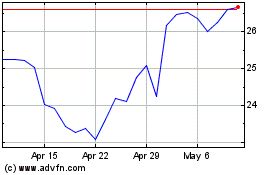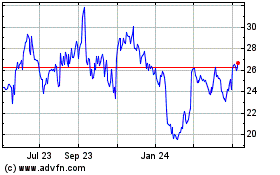Private Equity Warming To For-Profit Colleges; Hurdles Remain
January 19 2011 - 2:57PM
Dow Jones News
Private-equity firms are showing some renewed interest in
operators of for-profit colleges, though deal activity still may
not pick up until regulatory clouds begin to clear later this
year.
Industry insiders say that private-equity firms have been
inquiring about a number of companies in recent months, with
potential targets ranging from schools that offer short certificate
programs to more expensive bachelor's degree offerings. They are
looking at both private and publicly traded companies, these people
say.
BMO Capital Markets equity analyst Jeff Silber said his group
has had "at least one conversation with private-equity investors
about every post-secondary name we cover, as well as some we
don't."
Silber declined to provide the names of which firms have been
showing interest. His team covers private and publicly traded
companies including Corinthian Colleges Inc. (COCO) and Lincoln
Educational Services Corp. (LINC), both of which have been
considered takeover targets because of their low valuations, as
well as industry giant Apollo Group Inc. (APOL), DeVry Inc. (DV),
Education Management Corp. (EDMC) and others.
Companies, current stakeholders and prospective investors are
all awaiting a new rule from the U.S. Department of Education that
could transform the for-profit higher-education landscape. The
regulation, which is intended to measure how well programs prepare
students for gainful employment, could force schools to overhaul or
even shutter programs if their graduates have heavy debt loads.
Bruce Eatroff, a partner at private-equity firm Halyard Capital,
said his firm is "very bullish" over the medium term, defining that
time frame as anywhere from one to three years. Still, he said, the
firm "would not be against making the right for-profit investment
in the next year," once the regulatory environment becomes more
certain.
The uncertainty over the final version of the rule, and what
information will be used to measure how programs stack up, has kept
prospective investors at bay for much of the past year.
Regulatory issues brought "a screeching halt to the market for
post-secondary transactions" in mid-2010, said Jay Bartlett,
partner at The Parthenon Group and co-head of its global
private-equity practice, which helps conduct due diligence for
prospective investors.
Once the rule is released, likely within the next two months,
insiders say the deal pipeline will begin to fill back up.
"As soon as the regulations are published, I think you can
expect to see post-secondary assets coming to the market," said
Robert Lytle, a Parthenon partner focusing on for-profit
education.
To be sure, there is no shortage of private-equity firms testing
the waters. "The number of people who have looked at education
assets in North America in the last three years has really gone up
exponentially," Lytle said. The pickup began in earnest after
Laureate Education Inc. was taken private in early 2007. Lytle said
that this past summer, prospectuses were going out to "north of 100
different parties." That interest just didn't translate into
action.
There are other issues blocking the deal path even when
investors are ready to pounce. Lenders have been willing to give
for-profit college operators new credit lines or expand their
borrowing capacity, but are expected to remain skittish on funding
acquisitions for a few quarters.
"It's not like the lending flood gates open the day the
[regulation] comes on the books," BMO's Silber said, predicting it
will take months for companies to assess how the gainful-employment
measure will affect their growth capacity and access to the federal
student financial aid on which they rely for the vast majority of
their revenue. That, in turn, will keep lenders guessing how they
can determine companies' projected cash flows.
Eatroff said that in the meantime, companies looking to offload
assets to private-equity firms may need to extend seller financing
or find other creative means to close deals.
No matter what happens this year, "it'll certainly be more
active than the second half of 2010," Lytle said. "That was almost
a goose egg."
-By Melissa Korn, Dow Jones Newswires; 212-416-2271;
melissa.korn@dowjones.com
Vita Coco (NASDAQ:COCO)
Historical Stock Chart
From Mar 2024 to Apr 2024

Vita Coco (NASDAQ:COCO)
Historical Stock Chart
From Apr 2023 to Apr 2024
